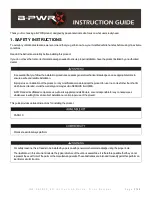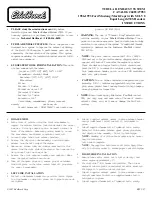
Section 1
Tester Basics
1-4
8
Used when checking some ignition modules. Makes
extra connections as required for testing.
Jumper Lead
9
Connector
Pin Adapters
Used for easier attachment of test leads to certain
sensor or wiring connector pins.
• Push one end of the adapter onto the desired
connector pin.
• Grasp the other end with the test lead clip.
Sensor
Tester
Power
A 9-volt transistor radio battery must be installed to
power the unit. Use an alkaline battery (conventional
batteries are too weak for ignition module testing).
Installing the Battery
1. Hold the tester face down with both hands.
2. Using both thumbs, firmly press downwards and
outwards on the battery compartment door at the
bottom of the tester.
3. Slide the battery compartment door away from the
tester to remove.
4. Attach battery to connector and install inside
compartment.
5. Replace battery door. Slide door inwards until it
snaps closed.
Checking the Battery
1. Make sure none of the test leads are connected
together or touching anything.
2. Set RANGE switch to HIGH.
3. Set FUNCTION switch to OHMS.
4. Battery is good if the top TEST light is ON. If any light
below the top TEST light is ON, the battery is too
weak for reliable testing and should be replaced.
TIP: To extend battery life, always switch to POWER
OFF when not making a measurement. This is safe to
do even if the tester is connected to a circuit.
9V
RANGE
HIGH
LOW
POWER OFF
FUNCTION
VOLTS
OHMS
FREQUENCY
TEST
Summary of Contents for CP9087
Page 82: ...3 22 Notes...









































